Saturday, July 22, 2006
What Venezuela can do

Of late, everyone is concerned about what is going on in the Middle East. We have discussed it on this blog, Chavez has spoken out to condem Israel's agressions, and thousands of Venezuelans have protested on behalf of those suffering in Lebanon and Gaza. Such acts of moral support and solidarity are great and important. But here is something more that Venezuela could do.
Israel has been using heavy equipment made by the Caterpillar company to destroy Palistinian homes and communities. In reaction to this a movement was started to pressure Caterpillar to stop selling Israel heavy equipment (the web-site has an excellent background document on how Israel has used this construction equipment).
Unfortunately, a major U.S. corporation is unlikely to be moved by moral arguements, especially when it cares about profits, not how its equipment is ultimately used. A boycott would be more effective. The problem is most of us probably don't buy heavy equipment very often. Yet Venezuela, with its huge construction boom, almost certainly does. Wouldn't it be a tremendous act of solidarity with the Palestinian and Lebanese people if Venezuela passed a law stating that companies that have Caterpillar equipment would be ineligible to work on government projects. This may not be enough to force a change, but it is an important act and if Venezuela and even some other countries do this it will show the U.S. its outrageous foreign policy isn't cost free.
|
Venezuelan tax collection continues to soar
A few months ago I mentioned that one of Chavez’s successes, and one of the main things the opposition hates him for, is he has vastly increased tax collections. Tax evasion is way down and revenues are way up compared to previous governments. Tax collections relative to GDP have increased a whopping 62.5% under Chavez.
But the Chavez government has never been one to rest on its laurels and this is no exception as tax collection keeps seeing dramatic improvement and record breaking numbers. In Thursday’s Ultimas Noticias they gave the amount of taxes collected through the first six months of the year.
In January through June of 2006 25.6 trillion bolivares, or $11.9 billion dollars, were collected in taxes. This is 37% more than the budgeted tax receipts. And it is 43.9% higher than the $8.27 billion dollars in taxes collected in the same period of 2005. In absolute terms $3.63 billion in additional tax revenue were collected so far this year versus 2005. And it bears recalling that 2005 itself was a record year for tax collection.
The taxes themselves consisted of $8.9 billion in income and value added taxes with $2.84 billion coming from import duties. The balance was made up of minor taxes.
These are superlative numbers that show A) that the governments tax collection efforts are becoming yet more efficient and effective and B) that economic activity in Venezuela continues to boom which also helps increase taxes.
|
But the Chavez government has never been one to rest on its laurels and this is no exception as tax collection keeps seeing dramatic improvement and record breaking numbers. In Thursday’s Ultimas Noticias they gave the amount of taxes collected through the first six months of the year.
In January through June of 2006 25.6 trillion bolivares, or $11.9 billion dollars, were collected in taxes. This is 37% more than the budgeted tax receipts. And it is 43.9% higher than the $8.27 billion dollars in taxes collected in the same period of 2005. In absolute terms $3.63 billion in additional tax revenue were collected so far this year versus 2005. And it bears recalling that 2005 itself was a record year for tax collection.
The taxes themselves consisted of $8.9 billion in income and value added taxes with $2.84 billion coming from import duties. The balance was made up of minor taxes.
These are superlative numbers that show A) that the governments tax collection efforts are becoming yet more efficient and effective and B) that economic activity in Venezuela continues to boom which also helps increase taxes.
|
Killer Facts - who is targeting civilians?
It is amazing to see how fast a conventional wisdom can develop around events and just how wrong that conventional wisdom can be. The Israel-Lebanon conflict is a perfect example.
The conventional wisdom which is now repeated over and over is that Hezbollah started rocketing Israel and that Israel then responded with attacks of its own. Further, it is asserted, Hezbollah is attacking civilians whereas Israel is careful to attack only military targets. A look at the facts shows both of those assertions are wrong.
First, how did this all begin? Lets have our memories refreshed by todays New York Times:
So the initial attack by Hezbollah was on a military target not civilians to which Israel responded with a generalized bombing campaign. The Israeli bombing brought the Hezbollah rockets, not the other way around. And it is not even an undisputed fact which side of the border the Israeli soldiers were on when they were attacked - and of course that makes quite a difference.
Next, we get to key point number two - who is attacking military targets and who is attacking civilians. From the same New York Times article we get the following facts. To date 34 Israelis have been killed, 19 soldiers and 15 civilians. So 55% of Israeli casualties have been military. Next it stated that 350 people have been killed in Lebanon of which Israel claims 100 have been Hezbollah fighters. That means over 71% of Lebanese casualties are civilians.
That makes things pretty clear. Israel, with all its sophisticated laser and satellite guided weapons is overwhelmingly killing civilians whereas Hezbollah, with much less sophisticated weaponry is mainly killing Israeli soldiers.
So looking at the facts two points are pretty clear - Israel, not Hezbollah, started the attacks on civilians, and Israel, not Hezbollah, is primarily targeting civilians.
|
The conventional wisdom which is now repeated over and over is that Hezbollah started rocketing Israel and that Israel then responded with attacks of its own. Further, it is asserted, Hezbollah is attacking civilians whereas Israel is careful to attack only military targets. A look at the facts shows both of those assertions are wrong.
First, how did this all begin? Lets have our memories refreshed by todays New York Times:
The face-off began when Hezbollah militants crossed into Israel, capturing two soldiers in an operation where eight others died. Israel responded with air bombardments, leading Hezbollah to unleash rockets, some possibly made or supplied by Iran or Syria, into northern Israel.
So the initial attack by Hezbollah was on a military target not civilians to which Israel responded with a generalized bombing campaign. The Israeli bombing brought the Hezbollah rockets, not the other way around. And it is not even an undisputed fact which side of the border the Israeli soldiers were on when they were attacked - and of course that makes quite a difference.
Next, we get to key point number two - who is attacking military targets and who is attacking civilians. From the same New York Times article we get the following facts. To date 34 Israelis have been killed, 19 soldiers and 15 civilians. So 55% of Israeli casualties have been military. Next it stated that 350 people have been killed in Lebanon of which Israel claims 100 have been Hezbollah fighters. That means over 71% of Lebanese casualties are civilians.
That makes things pretty clear. Israel, with all its sophisticated laser and satellite guided weapons is overwhelmingly killing civilians whereas Hezbollah, with much less sophisticated weaponry is mainly killing Israeli soldiers.
So looking at the facts two points are pretty clear - Israel, not Hezbollah, started the attacks on civilians, and Israel, not Hezbollah, is primarily targeting civilians.
|
Money not so well spent?
Yesterday it was announced that Venezuela had contracted for 30 Sukhoi figher planes and helicopters:
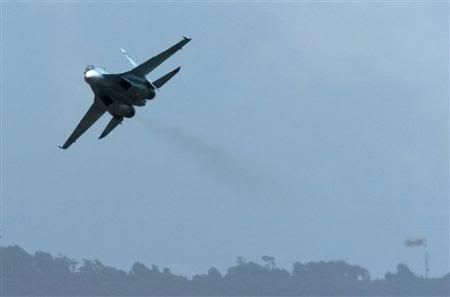
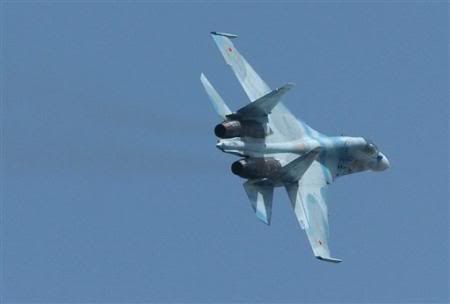
A billion dollars is certainly a lot of money. The recently completed subway line cost about $800 million. These planes aren't going to be used to fight the U.S. - they have no chance of doing that. Nor are they likely to be used to fight Brazil or Guyana as those countries have never threatened Venezuela (although Venezuela claims a lot of Guyana's territory). The only other potential threat is Colombia but it is is largely focused on its own internal security problems.
So Venezuela would appear to not need these planes to deal with its neighboors and they are clearly of little use against the one real potential threat. In a country with a lot of good alternative uses for this money this would appear not to be a smart move.
|

MOSCOW - Russia has struck a deal worth more than $1 billion to supply fighter jets and helicopters to Venezuela, Russian Defense Minister Sergei Ivanov said on Friday.
“The contract was concluded ... for the delivery of 30 Su-30 fighter aircraft and the delivery of the same number of helicopters,” state-owned Rossiya television showed Ivanov saying.
“The contract is for a sum in excess of one billion (dollars),” Ivanov added. The two sides announced weeks ago that they were working on the contract.
Venezuela’s President Hugo Chavez is buying the high-performance Sukhoi fighter jets to replace his government’s F-16 jets. Washington, D.C. has banned U.S. arms manufacturers from selling to Chavez, saying he is a dangerous autocrat.

A billion dollars is certainly a lot of money. The recently completed subway line cost about $800 million. These planes aren't going to be used to fight the U.S. - they have no chance of doing that. Nor are they likely to be used to fight Brazil or Guyana as those countries have never threatened Venezuela (although Venezuela claims a lot of Guyana's territory). The only other potential threat is Colombia but it is is largely focused on its own internal security problems.
So Venezuela would appear to not need these planes to deal with its neighboors and they are clearly of little use against the one real potential threat. In a country with a lot of good alternative uses for this money this would appear not to be a smart move.
|
Thursday, July 20, 2006
Venezuelans march against Israeli agression
Today there was a well attended march in Caracas against the Israeli attacks on Lebanon.
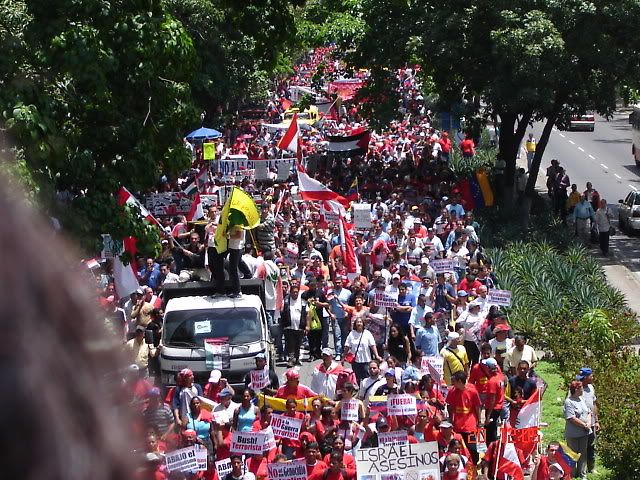
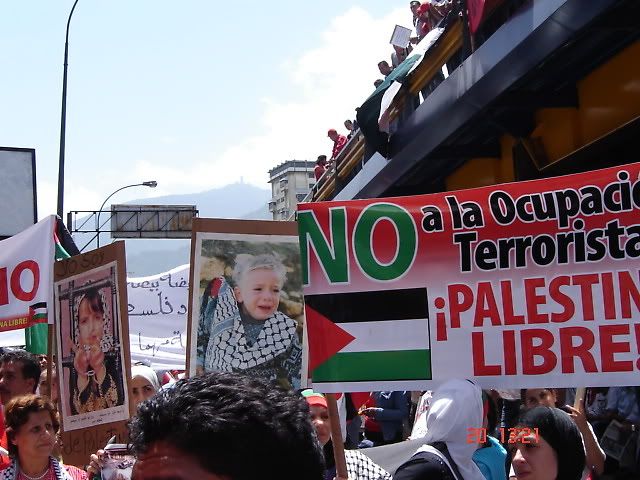
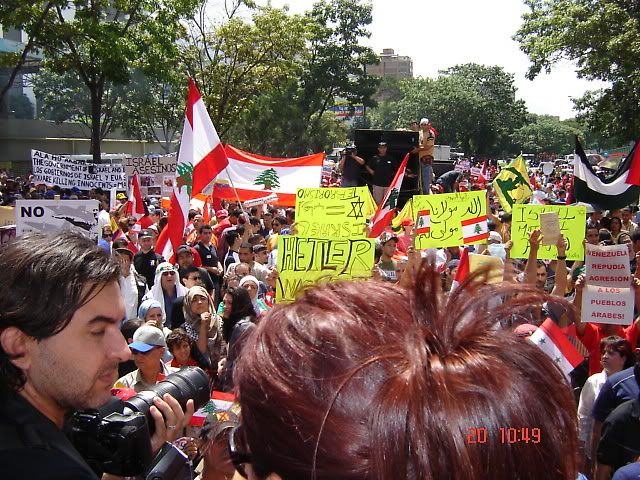
Venezuela can be proud not to have a government that backs these kind of brutal attacks against civilians in a neighboring democracy. Not all that long ago the "Cedar revolution" was all the wage - some right wing blogs even making it their blogs calling card. But of course, towing the U.S./Israeli line or bending to their will trumps democracy - as Lebanon and the Palistinians are finding out the hard way.
What we are seeing here is a clear manifestation of the old addage "might makes right". And until there are other nations that can rival the thugish superpowers ruling the roost now we are likely to see more of this. Thats the sad reality of the situation.
|



Venezuela can be proud not to have a government that backs these kind of brutal attacks against civilians in a neighboring democracy. Not all that long ago the "Cedar revolution" was all the wage - some right wing blogs even making it their blogs calling card. But of course, towing the U.S./Israeli line or bending to their will trumps democracy - as Lebanon and the Palistinians are finding out the hard way.
What we are seeing here is a clear manifestation of the old addage "might makes right". And until there are other nations that can rival the thugish superpowers ruling the roost now we are likely to see more of this. Thats the sad reality of the situation.
|
Wednesday, July 19, 2006
A view of state sponsored terrorism
In the comments section I mentioned there was an amazing picture of the descruction that Israel is causing Lebanon on the front page of the New York Times. I found it and here it is:
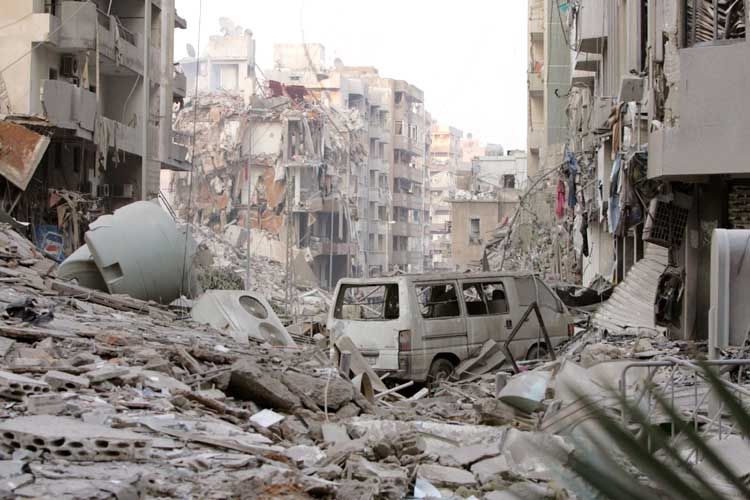
Unless someone can convince me that is nothing but a big military district, rather than the residential/commercial district it appears to be this sure looks like terrorism via U.S. made bombers. If you are a U.S. taxpaper, as I am sure many readers are, here are your tax dollars hard at work. Disgusting.
UPDATE
Here is a picture that appeared in the New York Times today:
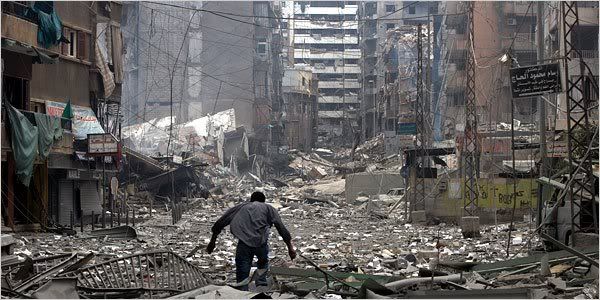
As it was quite large as an entire half page you could really get an appreciation of the devestation. But I think you can still get some idea from both the picture on this post that Isreal, as reprisal for the capture of two Israeli soldiers, has decided to wipe out a good part of Lebanon.
|

Unless someone can convince me that is nothing but a big military district, rather than the residential/commercial district it appears to be this sure looks like terrorism via U.S. made bombers. If you are a U.S. taxpaper, as I am sure many readers are, here are your tax dollars hard at work. Disgusting.
UPDATE
Here is a picture that appeared in the New York Times today:

As it was quite large as an entire half page you could really get an appreciation of the devestation. But I think you can still get some idea from both the picture on this post that Isreal, as reprisal for the capture of two Israeli soldiers, has decided to wipe out a good part of Lebanon.
|
Number 4 Metro line now in service.
It was a few days late, but here it is:
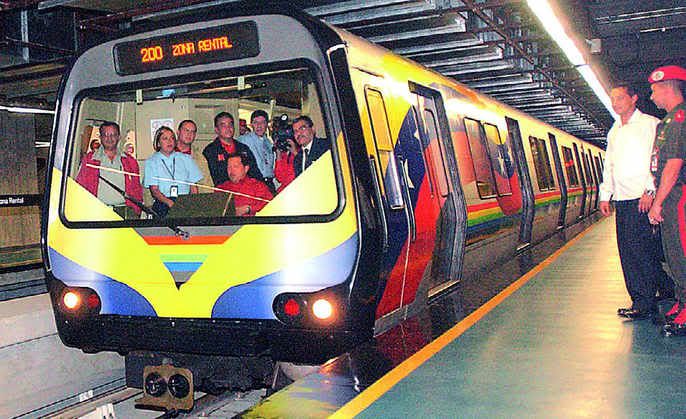
The brand new number 4 line is now in full service. I have to say I love that paint job on the first car!! Maybe they should think about doing that on all the subway cars (8 stars and all!).
By the way, notice who is doing some symbolic driving there? Yes, none other than Chavez. I guess that would be a pretty clear sign its an election year, if you didn't already know. Believe it or not some opposition candidate are so stupid that they could do nothing better than have front page articles in the newspapers they run criticizing Chavez for personally inaugurating the new metro line. You would think they could find real issues to talk about, like crime, but I guess not. Their stupidy is simply astounding.
As I pointed out before this is only the first half of the number 4 line. It was announced today that the contract to build the second half has already been awarded. It will cost another $800 million dollars and will take about 5 years to complete.
And thinking of going down there and personally seeing all the new things being built. Think again. In Ultimas Noticias today the head of the National Federation of hotels pointed out that there are currently no vacancies to be found in hotels in many parts of the country and along virtually its entire coast. Hotel occupancy is up between 18% and 22% in the past year. He attributed this to vastly increased domestic tourism by Venezuelans. So if you are planning a trip to Venezuela and will need to stay in a hotel you better make your plans well in advance.
|

The brand new number 4 line is now in full service. I have to say I love that paint job on the first car!! Maybe they should think about doing that on all the subway cars (8 stars and all!).
By the way, notice who is doing some symbolic driving there? Yes, none other than Chavez. I guess that would be a pretty clear sign its an election year, if you didn't already know. Believe it or not some opposition candidate are so stupid that they could do nothing better than have front page articles in the newspapers they run criticizing Chavez for personally inaugurating the new metro line. You would think they could find real issues to talk about, like crime, but I guess not. Their stupidy is simply astounding.
As I pointed out before this is only the first half of the number 4 line. It was announced today that the contract to build the second half has already been awarded. It will cost another $800 million dollars and will take about 5 years to complete.
And thinking of going down there and personally seeing all the new things being built. Think again. In Ultimas Noticias today the head of the National Federation of hotels pointed out that there are currently no vacancies to be found in hotels in many parts of the country and along virtually its entire coast. Hotel occupancy is up between 18% and 22% in the past year. He attributed this to vastly increased domestic tourism by Venezuelans. So if you are planning a trip to Venezuela and will need to stay in a hotel you better make your plans well in advance.
|
Crime, crime, everywhere crime
As has been pointed out on this blog before, mainly in reference to some pretty bad statistics, crime is very much out of control in Venezuela and the government seems to be doing far too little about it. Today rather than give statistics I want to give the accounts of two recent crime events that occurred to people I know well in Barquisimeto Venezuela in just the past few days.
In the first instance a friend was walking along a street in downtown Barquisimeto last week talking on her cell phone when she was attacked, thrown to the ground and had her purse and cell phone snatched away by some thieves. In addition to the property loss she was physically hurt in her arm and leg and was of course very shaken up. Acquaintances of hers told her matter of factly “speaking on a cell phone on the street, what did you expect?” And lest the reader think this is was some fancy slim cell phone that folds up nicely and takes pictures, no it wasn’t. This, like the cell phones many Venezuelans have, is a very old and simple model that no criminal in the U.S. would be caught dead stealing. Yet in the downtown area of one of Venezuela’s major cities you can’t risk using it publicly for fear of being assaulted.
The second incident is far worse. A person was visiting a friend in the Macuto section of Barquisimeto. That is a very poor area on the southern fringe of the city. While he waited outside for his friend to come out he was accosted by a group of criminal who insisted he turn over his motorcycle. Again, suffice it to say this wasn’t a fancy Harley-Davidson. Unwisely, he resisted turning it over and was shot dead. In a disgustingly ironic twist the criminal then couldn’t figure out how to start it and left without the motorcycle.
Both of those incidents occurred in just the past five days. The statistics on crime, as has been pointed out, are indeed deplorable. And when you have to listen to these two tales of crime in the past week it is indeed horrific. Opposition bloggers have noted that so far Chavez has managed to escape blame for this and it seems not to have dented his popularity. That is true up to this point probably because the economy is booming and for most people that is the overriding issue. But this every day horror that is the crime situation in Venezuela can’t go on forever without people getting fed up enough about it that they will vote any politician out for letting it continue. Chavez would do well, and the country would benefit enormously, if he would wake up to that reality sooner rather than later. After all, as others have pointed out, a booming economy doesn’t do much for you when you’re dead.
|
In the first instance a friend was walking along a street in downtown Barquisimeto last week talking on her cell phone when she was attacked, thrown to the ground and had her purse and cell phone snatched away by some thieves. In addition to the property loss she was physically hurt in her arm and leg and was of course very shaken up. Acquaintances of hers told her matter of factly “speaking on a cell phone on the street, what did you expect?” And lest the reader think this is was some fancy slim cell phone that folds up nicely and takes pictures, no it wasn’t. This, like the cell phones many Venezuelans have, is a very old and simple model that no criminal in the U.S. would be caught dead stealing. Yet in the downtown area of one of Venezuela’s major cities you can’t risk using it publicly for fear of being assaulted.
The second incident is far worse. A person was visiting a friend in the Macuto section of Barquisimeto. That is a very poor area on the southern fringe of the city. While he waited outside for his friend to come out he was accosted by a group of criminal who insisted he turn over his motorcycle. Again, suffice it to say this wasn’t a fancy Harley-Davidson. Unwisely, he resisted turning it over and was shot dead. In a disgustingly ironic twist the criminal then couldn’t figure out how to start it and left without the motorcycle.
Both of those incidents occurred in just the past five days. The statistics on crime, as has been pointed out, are indeed deplorable. And when you have to listen to these two tales of crime in the past week it is indeed horrific. Opposition bloggers have noted that so far Chavez has managed to escape blame for this and it seems not to have dented his popularity. That is true up to this point probably because the economy is booming and for most people that is the overriding issue. But this every day horror that is the crime situation in Venezuela can’t go on forever without people getting fed up enough about it that they will vote any politician out for letting it continue. Chavez would do well, and the country would benefit enormously, if he would wake up to that reality sooner rather than later. After all, as others have pointed out, a booming economy doesn’t do much for you when you’re dead.
|
Monday, July 17, 2006
Economic Notes: Non-oil exports boom and debt goes down
The good economic news in Venezuela keeps coming fast and furiously, so much so that this blogger can hardly keep up with it.
First on the old news front non-oil, non-oil related, and non - iron exports are up 62.5% in the first 6 months of 2006 compared to the first 6 months of 2005 - the increase was from $4.6 billion to 7.6 billion dollars. So while the opposition likes to keep asserting that all that Venezuela is experiencing is an oil boom these stats give lie to that - Venezuela's non-oil exports are booming. The following chart gives a breakdown for these exports by region.
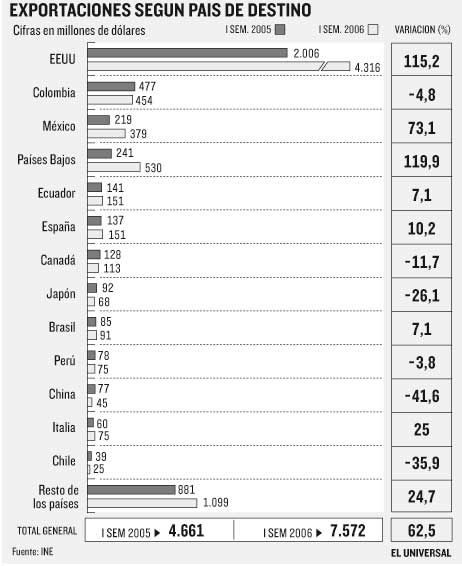
Then today came more good news. Venezuela's national debt in relation to the size of its economy has been falling recently and is now below the level of when Chavez first came to office. As the following graphic shows the national debt is 26.7% of GDP in May whereas it was 30% in 1998 right before Chavez came to office.
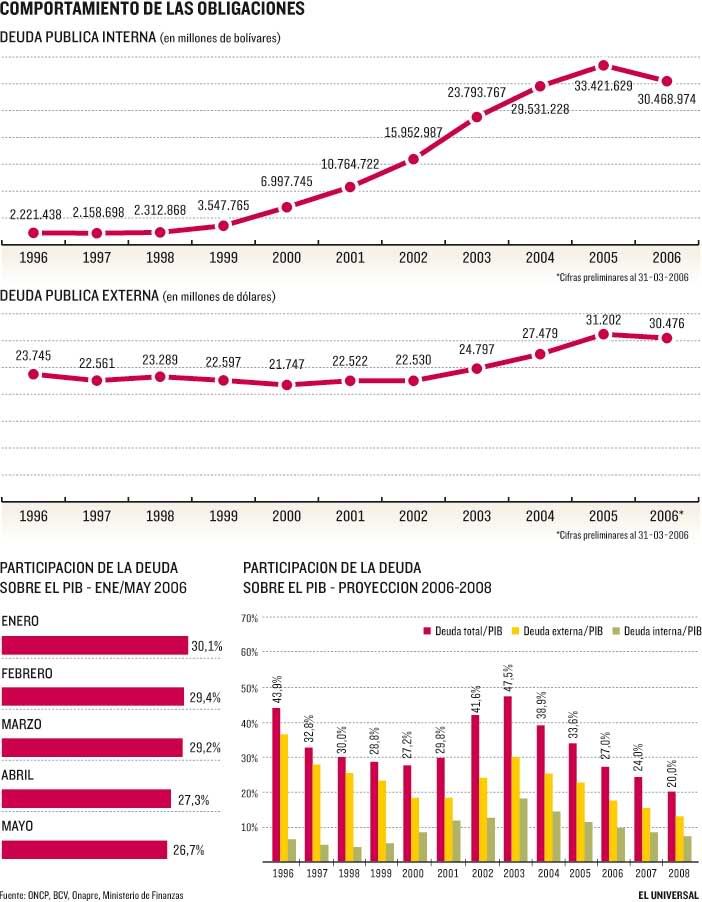
Further it is clearly trending downward significantly. And by way of comparison, U.S. Federal government debt as a percentage of GDP is about 70%.
And while Venezuela still has significant outstanding debt there are two other factors that make the situation even better than what this graph shows. First, I am virtually certain this debt is only debt held by the government directly and doesn't include the debt which the state oil company had, about $7 billion, which has now been almost entirely paid off. If that were taken account of, as it should be that debt of a state owned company is in effect government debt, then the Chavez administrations performance is even more impressive.
The second factor is that this decline in debt in relation to the economy is that it doesn't take into account the assets the Venezuelan government has built up - namely its foriegn reserves. As the following graph shows those reserves were less than $15 billion when Chavez came to power but are now more than double that at over $32 billion dollars.

So that means the Venezuelan governments net financial position is better yet - in fact its foreign reserves are greater than its foriegn debt. Wonder when the last time that happened was?
To summarize: Under Chavez non-oil exports are booming, debt is declining relative to the size of the economy, and reserves have more than doubled. A pretty impressive track record!
|
First on the old news front non-oil, non-oil related, and non - iron exports are up 62.5% in the first 6 months of 2006 compared to the first 6 months of 2005 - the increase was from $4.6 billion to 7.6 billion dollars. So while the opposition likes to keep asserting that all that Venezuela is experiencing is an oil boom these stats give lie to that - Venezuela's non-oil exports are booming. The following chart gives a breakdown for these exports by region.

Then today came more good news. Venezuela's national debt in relation to the size of its economy has been falling recently and is now below the level of when Chavez first came to office. As the following graphic shows the national debt is 26.7% of GDP in May whereas it was 30% in 1998 right before Chavez came to office.

Further it is clearly trending downward significantly. And by way of comparison, U.S. Federal government debt as a percentage of GDP is about 70%.
And while Venezuela still has significant outstanding debt there are two other factors that make the situation even better than what this graph shows. First, I am virtually certain this debt is only debt held by the government directly and doesn't include the debt which the state oil company had, about $7 billion, which has now been almost entirely paid off. If that were taken account of, as it should be that debt of a state owned company is in effect government debt, then the Chavez administrations performance is even more impressive.
The second factor is that this decline in debt in relation to the economy is that it doesn't take into account the assets the Venezuelan government has built up - namely its foriegn reserves. As the following graph shows those reserves were less than $15 billion when Chavez came to power but are now more than double that at over $32 billion dollars.

So that means the Venezuelan governments net financial position is better yet - in fact its foreign reserves are greater than its foriegn debt. Wonder when the last time that happened was?
To summarize: Under Chavez non-oil exports are booming, debt is declining relative to the size of the economy, and reserves have more than doubled. A pretty impressive track record!
|
Sunday, July 16, 2006
21st Century Socialism
Here is an interesting article on the new co-operatives being set up by the government. Apparently they are not all new enterprises. Some are existing concerns which switch to the new model in exchange for government support. I have to say I was impressed as this was one of the first general news agency articles to get the poverty statistics right - maybe progress is being made after all:
And it had this interesting sidebar:
|
Venezuela tries '21st-century socialism'
By Natalie Obiko Pearson
the associated press
CARACAS, Venezuela — A landslide all but wiped out Wilfredo Rodriguez's small shoemaking business last year, entitling him to a loan from President Hugo Chavez's government — money he says he never would've found elsewhere.
It came with strings attached — his workers get limited co-ownership and he must make payments to community projects. But no matter. The factory is thriving. Its 14 workers produce 1,200 pairs of shoes each month and has begun selling sandals to Cuba.
Cooperatives and co-managed "social production" companies such as Rodriguez's shoe factory are the backbone of the new "21st-century socialism" that Chavez is trying to create.
Venezuela's iconoclastic leader is fond of saying he's inventing a new sort of economy that won't just forever alter Venezuelan society but will also serve as an egalitarian model for the entire world.
Such claims may sound exaggerated for a country buoyed by oil wealth where capitalist businesses continue to drive the economy. But in little more than seven years, Chavez's powerful personality and ample petrodollars have transformed Venezuela's economy into a distictive mishmash of public and private enterprise.
By many measures, Venezuela has ceased to be a free-market capitalist society. Billions of dollars are now diverted annually to state-directed social spending; cooperatives jointly owned and operated by workers are favored for government loans and contracts; and new state-owned companies challenge private sector heavyweights, producing everything from tractors to laptops for the poor.
For one, banking regulations require a third of all loans to go to small businesses, low-income mortgages and state-favored sectors at below-market rates.
Economists say it's uncertain whether Chavez's new model, greatly dependent on high oil prices, is sustainable.
But in the meantime, they say the Chavez experiment — to subordinate private enterprise to broader social aims — has become a powerful symbol in Latin America, where U.S.-backed free-market policies of the 1980s and '90s have caused deep disillusionment.
"I think we are seeing something innovative. Venezuela is aspiring to represent an alternative way of organizing society," said Laura Enriquez, a Latin America expert at the University of California-Berkeley.
Chavez has repeatedly expressed admiration for the communist China of Mao Zedong, the leftist dictatorships of Gen. Juan Velasco in Peru and Gen. Omar Torrijos in Panama, and Libya under Moammar Gadhafi, whose economy was similarly oil-based and marked by state cooperatives.
Under Chavez's "people's" action plan, the state also helps pay stipends to workers in various farming and industrial cooperatives — which now total 108,000 in the country, up from about 800 when Chavez came to power, and account for about 5 percent of all jobs.
Official statistics reveal positive signs: 9.4 percent economic growth last year — South America's highest — and a poverty level that has declined from 48 percent of the population in 1997 to 37 percent today. Last year, Venezuelans' per capita income was about $4,900, compared with $42,000 for Americans.
But others don't believe Chavez is creating conditions for long-term growth. The economy is dominated by oil; capital flight continues; and nearly half the work force is estimated to remain in the informal economy in dead-end jobs, including street vendors and laborers.
The conservative Washington-based Heritage Foundation think tank found Venezuela's business climate inhospitable and "repressed" this year, ranking it 152 out of 157 countries — just above Zimbabwe and North Korea.
And it had this interesting sidebar:
Inside '21st-century socialism'
● CARACAS, Venezuela — Wilfredo Rodriguez received a $318,000 government loan to rebuild his shoe factory after a landslide.
His is one of more than 100,000 private businesses now running as cooperatives in Venezuela that have received state assistance on condition they abide by certain "socially minded" principles:
l 10 percent of earnings must go for social programs in his local community.
l The loan has a one-year grace period and he has up to eight years to pay at 4 percent annual interest.
l Rodriguez keeps 60 percent of earnings and divides the rest equally among the other workers.
l The business donated $3,000 worth of shoes to poor families ilast Christmas.
l Group participation in company decisions, including a governing council comprised of Rodriguez, his wife and two workers that meets monthly to set production goals.
l Monthly visit by a government inspector, who ensures the company is adhering to socialist principles.
|
Number 4 to the rescue - eventually
As had been mentioned before President Chavez was to open the new number 4 subway line in Caracas today. However, due to scheduling conflicts it had to be postponed. The new number 4 line cost 800 million dollars to build and will be used by an estimated 400,000 people daily. To show why this new subway line is so vital take a look at a map of the Caracas Metro system:
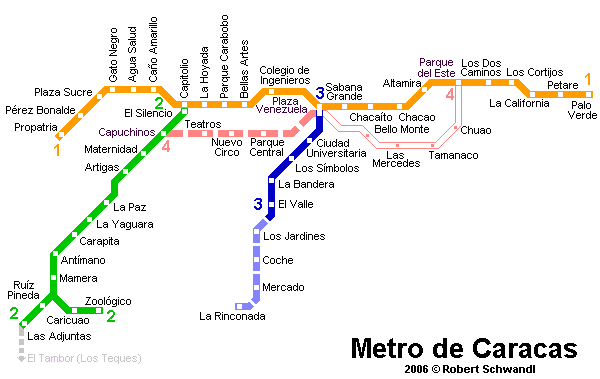
There are three lines currently in use, the orange number 1 line, the green number 2 line, and the dark blue number 3 line. The number 1 line which transverses Caracas from East to West is far and away the busiet line carrying over a million passengers daily. Although service is frequent the trains are very crowded, sometimes to the point that it is impossible to get on and quite uncomfortable once inside. The worst crowding is between El Capitolio where it intersects with the number 2 line and the Plaza Venezuela station where it intersects with the number 3 line.
To relieve this congestion the Chavez government has built the number 4 line which will run parrallel to the number 1 line between lines 2 adn 3. It is shown on the map as the dark pink line and has stations such as Teatros, Nuevo Circo, and Parque Central. This line should do much to relieve the congestion on line 1.
By the way, while we are on the subject of the subway system note the light blue line below extending down from the number 3 subway line. That is the extension to the number 3 line which is to partially open later this year, with service only between El Valle and La Rinconada but no intermediate stops. The intermediate stations are to open in late 2007 or early 2008. At some point the eastern half of the number 4 line should be built, shown as light pink on the map, but construction of it has yet to begin and I am not sure a date is even set for it.
Here are some pictures from the #4 line. Sorry they are a couple of months old when it was still under construction. Hopefully soon we will have pictures of the gleaming new subway line full of happy, or at least happier, passengers.
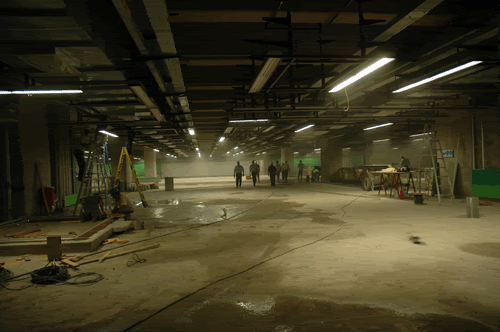
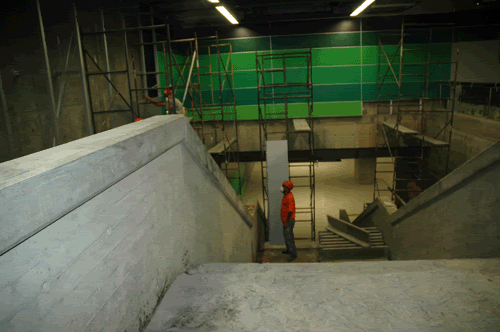
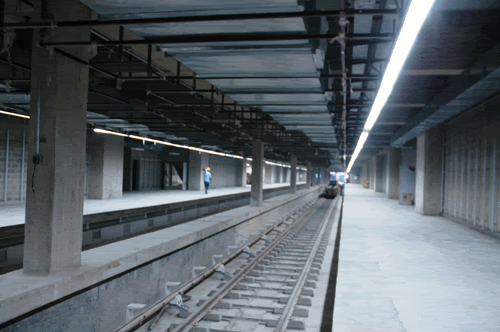
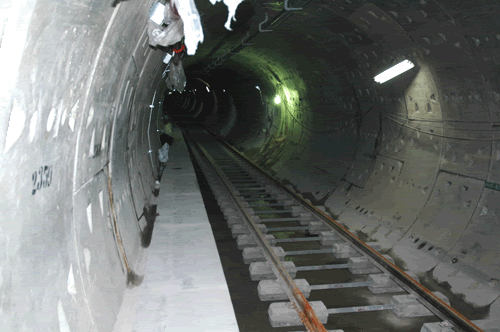
|

There are three lines currently in use, the orange number 1 line, the green number 2 line, and the dark blue number 3 line. The number 1 line which transverses Caracas from East to West is far and away the busiet line carrying over a million passengers daily. Although service is frequent the trains are very crowded, sometimes to the point that it is impossible to get on and quite uncomfortable once inside. The worst crowding is between El Capitolio where it intersects with the number 2 line and the Plaza Venezuela station where it intersects with the number 3 line.
To relieve this congestion the Chavez government has built the number 4 line which will run parrallel to the number 1 line between lines 2 adn 3. It is shown on the map as the dark pink line and has stations such as Teatros, Nuevo Circo, and Parque Central. This line should do much to relieve the congestion on line 1.
By the way, while we are on the subject of the subway system note the light blue line below extending down from the number 3 subway line. That is the extension to the number 3 line which is to partially open later this year, with service only between El Valle and La Rinconada but no intermediate stops. The intermediate stations are to open in late 2007 or early 2008. At some point the eastern half of the number 4 line should be built, shown as light pink on the map, but construction of it has yet to begin and I am not sure a date is even set for it.
Here are some pictures from the #4 line. Sorry they are a couple of months old when it was still under construction. Hopefully soon we will have pictures of the gleaming new subway line full of happy, or at least happier, passengers.




|
